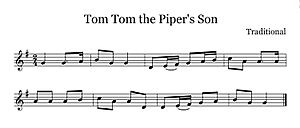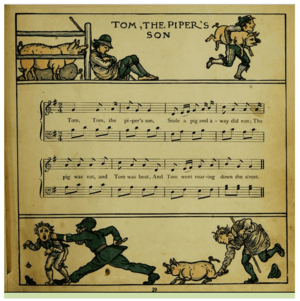Tom, Tom, the Piper's Son facts for kids
Quick facts for kids "Tom, Tom, the Piper's Son" |
|
|---|---|

Sheet music
|
|
| Nursery rhyme | |
| Published | 1795 |
"Tom, Tom, the Piper's Son" is a very old and well-known English language nursery rhyme. It's a fun rhyme that many children have learned for a long time. This rhyme is listed in the Roud Folk Song Index as number 19621.
Understanding the Rhyme's Words
Modern versions of the rhyme often go like this:
- Tom, Tom, the piper's son,
- Stole a pig, and away did run;
- The pig was eat
- And Tom was beat,
- And Tom went crying
- Down the street.
When the rhyme mentions "pig," it's probably not a real animal. It most likely means a type of small pastry, often filled with apples, like a tiny pie. So, the rhyme tells the story of a mischievous boy named Tom. His father was a piper, someone who plays a pipe instrument. Tom takes this "pig" pastry, eats it, and then gets into trouble. After being punished, Tom cries as he goes down the street.
Another way the rhyme is sometimes told is:
- Tom, Tom, the piper's son,
- Stole a pig, and away he run.
- Tom run here,
- Tom run there,
- Tom run through the village square.
This short rhyme is sometimes mixed up with a longer, different rhyme about Tom.
The Longer Rhyme About Tom
There is another, longer rhyme about a character named Tom, who is also a piper's son. This rhyme tells more about his musical talents:
- Tom, he was a piper's son,
- He learnt to play when he was young,
- And all the tune that he could play
- Was 'over the hills and far away';
- Over the hills and a great way off,
- The wind shall blow my top-knot off.
- Tom with his pipe made such a noise,
- That he pleased both the girls and boys,
- They all stopped to hear him play,
- 'Over the hills and far away'.
- Tom with his pipe did play with such skill
- That those who heard him could never keep still;
- As soon as he played they began for to dance,
- Even the pigs on their hind legs would after him prance.
- As Dolly was milking her cow one day,
- Tom took his pipe and began to play;
- So Dolly and the cow danced 'The Cheshire Round',
- Till the pail was broken and the milk ran on the ground.
- He met old Dame Trot with a basket of eggs,
- He used his pipe and she used her legs;
- She danced about till the eggs were all broke,
- She began for to fret, but he laughed at the joke.
- Tom saw a cross fellow was beating an ass,
- Heavy laden with pots, pans, dishes, and glass;
- He took out his pipe and he played them a tune,
- And the poor donkey's load was lightened full soon.
Where the Rhymes Came From
Both the short and long rhymes first appeared in a small book called Tom the Piper's Son. This book was printed around 1795 in London, England. We don't know exactly how the shorter, more famous rhyme started.
The longer rhyme, however, was changed from an older poem. This older poem was popular in England in the late 1600s and early 1700s. For example, a verse called "The Distracted Jockey's Lamentations" might have been written for a play in 1698.
This older verse was later changed into a song to encourage people to join the army. This happened around 1705 for the campaigns led by the Duke of Marlborough. This recruiting song was called "The Recruiting Officer; or The Merry Volunteers," and it's now better known as "Over the Hills and Far Away." In this song, the hero is also named Tom.
 | Jessica Watkins |
 | Robert Henry Lawrence Jr. |
 | Mae Jemison |
 | Sian Proctor |
 | Guion Bluford |


